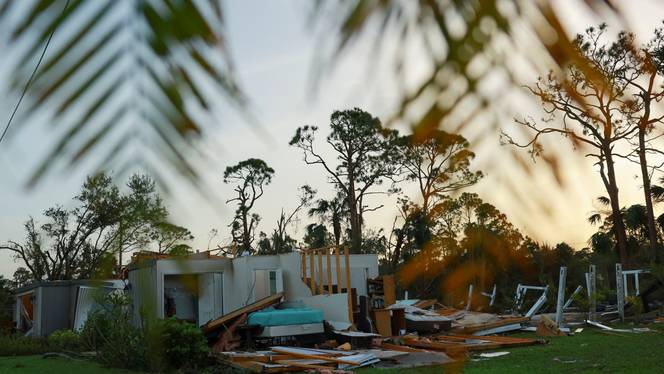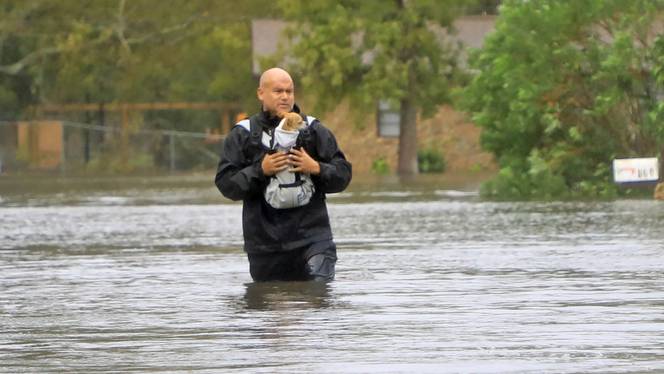A resident on Magnolia Avenue cradles his dog as he surveys the flooding damage after Hurricane Milton passed in South Daytona, Florida, on October 11, 2024. Photo: Reuters
Relief agencies in the US are running out of money as Congress drags its feet over disaster funding bills meant for helping the rising number of hurricane victims in multiple states.
The reluctance of the members of Congress, which is in recess until November 12, to write a cheque for relief work is in stark contrast to the quick approval of substantially higher military funding for countries like Israel and Ukraine a few months ago.
Israel alone has received nearly $23 billion in aid from the US in one form or another since October 7, 2023. That translates to over $2,400 for every Israeli citizen.
On the other hand, maximum financial assistance from the US government immediately available to Hurricane Milton survivors is only $770 per person.
Prioritising funding for overseas wars with no direct US involvement over disaster relief for millions of Americans at home led Republican presidential candidate Donald Trump to launch into a tirade against the Biden-Harris administration.
“They’re offering $750 to people whose homes have been washed away,” Trump said at a recent campaign rally. “And yet we send tens of billions of dollars to foreign countries that most people have never heard of,” the former president said.
Millions of Americans were ordered to evacuate as Hurricane Milton slammed into Florida on Thursday. It knocked out electricity for about 3.2 million people as powerful winds, heavy rain and tornadoes wreaked havoc in the Gulf Coast.
The fifth-most-intense Atlantic hurricane on record, Milton could cost insurers alone up to $100 billion.
Milton also hit the communities battered two weeks ago by Hurricane Helene, which killed 231 people in six states and caused losses worth “billions of dollars”.
Stark difference, in plain numbers
The Federal Emergency Management Agency (FEMA) is the primary body responsible for coordinating disaster relief efforts in the US. But the money used in the aftermath of Helene and other major disasters comes from the Disaster Relief Fund (DRF) instead of FEMA’s operating budget.
Congress is responsible for setting aside funds for DRF. Last month, it approved a “stopgap spending measure” to replenish the DRF at the previous year’s baseline level of $20 billion.
But some of that $20 billion is meant for relief work that began before the latest wave of hurricanes hit southern parts of the US.
In contrast, Congress set aside more than $95 billion for Israel, Ukraine and Indo-Pacific partners under three “security supplemental” acts passed in April.
FEMA can meet “immediate needs” but does not have enough funding to make it through the hurricane season, according to Alejandro Mayorkas, secretary of Homeland Security Department, the parent body of the emergency management agency.
The hurricane season in the US lasts until the end of November. “FEMA does not have the funds to make it through the season,” said Mayorkas.
A Washington Post report noted that FEMA appears to have enough money for its individual assistance programme, which provides immediate cash to disaster victims to cover the costs of food, water, baby formula and medication.
However, FEMA runs the risk of running out of funding for its public assistance programme, which reimburses state and local governments for the costs of debris clean-up, first responders and other needs.

The fifth-most-intense Atlantic hurricane on record, Milton could cost insurers alone up to $100 billion. Photo: Reuters
Congress is no hurry
In order to approve funds for FEMA, Congress will have to end its recess and convene an urgent session.
But members of Congress are busy campaigning ahead of the next month’s elections.
In fact, Congress has not yet passed supplemental funding for other disasters that occurred earlier in the year, much to the frustration of members from the communities recovering from floods, fires and other major events.
House Speaker Mike Johnson, a Republican from Louisiana, has shown little interest in calling members back to Washington early to arrange the money needed for disaster relief.
“Look, we’ll be back in session immediately after the election,” Johnson said .
“That’s 30 days from now. The thing about these hurricanes and disasters of this magnitude is that it takes a while to calculate the actual damages, and the states are going to need some time to do that,” he said.
But pressure is gradually mounting on Congress to act fast. A group of Congress members has urged Speaker Johnson to reconvene the chamber to take up disaster funding bills.
“Recent legislation has provided initial relief funds, yet these provisions fall critically short of what will be necessary to address the scale of destruction and the recovery needs,” the lawmakers’ letters said.
Underwriting wars for Israel, Ukraine
While Congress appears in no rush to provide funds for millions of Americans in distress because of back-to-back natural disasters, the size of military aid to Israel, Ukraine and Indo-Pacific partners seems staggering in contrast.
US spending on Israeli military and related operations in the Middle East since October 7, 2023, is nearly $22.7 billion, substantially higher than in any other year since Washington began granting military aid to Israel in 1959.
Of $22.7 billion, almost $18 billion was labelled as “US security assistance to Israel” while $4.8 billion was the cost of US military operations in the region.
Similarly, Congress approved in April almost $61 billion in funding for Ukraine in the name of assisting “regional partners” in their fight against Russia.
Separately, it set aside more than $8 billion for partners in the Indo-Pacific to help them “counter communist China” in the region.
The US also allocated $156 million in its last budget for the PYD/YPG-dominated SDF. PYD/YPG is the Syrian affiliate of the PKK terror group. In its almost 40-year terror campaign against Türkiye, the PKK — listed as a terror organisation by Türkiye, the US and the EU — has been responsible for the deaths of more than 40,000 people, including women, children and infants.
The US also allocated $156 million to the PYD/YPG-dominated SDF in Syria in its latest budget. The PYD/YPG is the Syrian branch of the PKK terrorist group. The PKK – listed as a terrorist organisation by Türkiye, the US and the EU – is responsible for the deaths of more than 40,000 people, including women, children and infants, in its nearly 40-year terror campaign against Türkiye.















